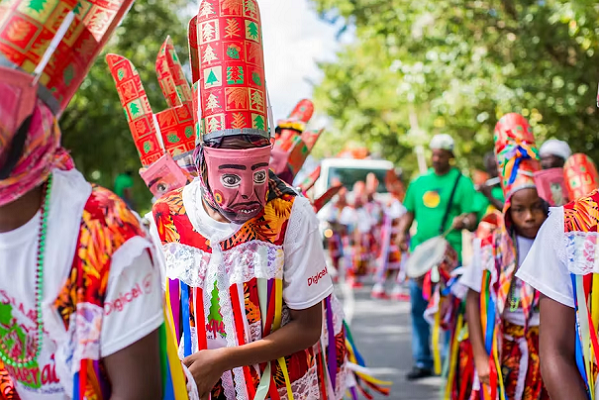
The full title of this article by Ellen Howley (The Conversation) is “Entangled Islands exhibition explores the history of Irish people in the Caribbean – an expert review.” Entangled Islands: Ireland and the Caribbean is on view until February 2024 at EPIC, the Irish Emigration Museum. [Also see our previous post Exhibition: Entangled Islands; also see a description of the show in the video below.]
A new exhibition at Epic, Dublin’s Irish emigration museum, explores connections between Ireland and the Caribbean. Entangled Islands aims to tell “the stories of a wide range of Irish people who traversed and settled in the Caribbean”, while also outlining “our intersecting histories of colonisation and resistance”.
The exhibition was partly inspired by growing academic research into connections between Ireland and the Caribbean in the last 20 years. Such research, as the exhibition explains, “complicates understandings of the Irish diaspora as a historically marginalised people”. The extent of this scholarship is clear across the exhibition, although the tone is accessible throughout.
One prominent theme is a reevaluation of Ireland’s role in the transatlantic slave trade. The topic has previously been tackled in books such as Ireland, Slavery and Anti-Slavery: 1812-1965 by Nini Rodgers (2007) and Ireland, Slavery and the Caribbean (2023), edited by Finola O’Kane and Ciaran O’Neill.
The exhibition focuses mainly on the stories of individual Irish people in the Caribbean, with some limited exploration of the wider context. While there are references to the positions of power many Irish people held under the colonial system, the extent of this fact – or its brutalities – do not occupy a large portion of the exhibition. [. . .]
The Irish slave myth
The exhibition is more explicit is in its discussion of the “Irish slave” myth. This refers to an online misinformation meme that falsely claims Irish people were enslaved in the Americas but have managed to succeed, nevertheless.
As one exhibition panel explains, the myth “persists in the face of contrary evidence”. The exhibition declares that: “White nationalists and racists, in particular, have seized on the myth in an attempt to undermine the unique suffering of enslaved Africans.”
The strength of this statement is notable, but perhaps because the meme remains most popular in North American territories, rather than in the UK and Ireland, a sense of distance allows for such unequivocal language.
There is close attention to language across the exhibition, such as the consistent use of “enslaved”, in place of “slave(s)”. This is welcome and reflects reconsiderations, both in academia and beyond, of the extent to which the transatlantic slave trade was foundational to the making of modern Europe.
The layered meanings of “entangled” in the exhibition’s title are evident in the exploration of a number of connections from journalistic, to literary, as well as enslavement and colonialism.
At the same time, as the exhibition shows, there have been moments of solidarity between Ireland and the Caribbean, regions connected by their colonial pasts. Abolitionists such as Dubliner James Field Stanfield and Belfast man Thomas McCabe feature prominently, the latter ensuing an all-island perspective is included. [. . .]
For full review, see https://theconversation.com/entangled-islands-exhibition-explores-the-history-of-irish-people-in-the-caribbean-an-expert-review-217995
The full title of this article by Ellen Howley (The Conversation) is “Entangled Islands exhibition explores the history of Irish people in the Caribbean – an expert review.” Entangled Islands: Ireland and the Caribbean is on view until February 2024 at EPIC, the Irish Emigration Museum. [Also see our previous post Exhibition: Entangled Islands; also see







